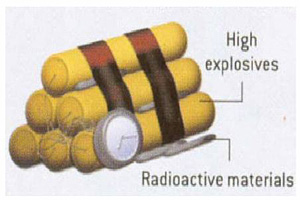 |
 |
 |
 News from Around the Americas | April 2007 News from Around the Americas | April 2007  
US Donates "Dirty Bomb" Detectors to Mexican Ports
 Reuters Reuters


| | A dirty bomb is not a nuclear bomb. It is a radiological dispersion device (RDD). It is easy to build, conventional explosive packed with radioactive material. Above shows a simple crude form of a dirty bomb. When such a bomb is exploded, it will disperse radioactive material. A high dose of high energy radiation, such as X-ray emitted by radioactive dust, can induce cancer. (Scientific American) |
The United States will donate radiation detectors to Mexico and help install them in busy sea ports to prevent a terrorist attack with a "dirty bomb" or other radioactive material.

The U.S. Department of Energy will provide equipment and train customs officers at major ports on the Pacific and Gulf of Mexico coasts, Mexico's Finance Ministry said in a statement on Monday.

The United States believes the smuggling of nuclear material, a dirty bomb or other weapons of mass destruction in a commercial cargo container to be a major security threat.

In February, a Saudi wing of al Qaeda called for attacks on suppliers of oil to the United States, including Mexico.

"Mexico customs will be able to install, in a very short term, the most advanced nuclear and radioactive detection technology, allowing Mexico's customs ports to be among the world's most secured and efficient," Finance Minister Agustin Carstens said.

Scientists say it would be easy for terrorists to strap low-grade radioactive material to conventional explosives, creating a so-called dirty bomb meant to spread radiation over a wide area.

Mexico increasingly receives cargo ships from Asia destined for the United States. Cargo is unloaded in Mexico and transported by land to its northern neighbor.

After the al Qaeda threat, U.S. Homeland Security Secretary Michael Chertoff said Mexico, the second-largest exporter of crude to the United States, did not need to take additional measures to make its oil installations safe.

Many Americans worry the 2,000-mile (3,200-km) U.S.-Mexico border, much of it passing through remote desert areas, is a potentially easy place for terrorists to sneak weapons of mass destruction into the United States.

The United States is building a controversial fence along parts of the border to reduce illegal migration and stop rampant drug smuggling. It has posted national guard troops along parts of the frontier.

The detection equipment will be installed in Manzanillo, Lazaro Cardenas, Altamira and Veracruz, ports that account for 92 percent of the Mexico's maritime trade.

The first set of equipment should be installed and working by the end of the year, the ministry said. | 
 | |
 |



